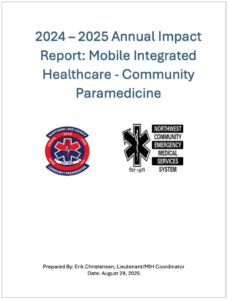Lake County MIH Program Achieves 85% Reduction in ER Visits During First Year
The Northern Lake County Mobile Integrated Healthcare (NLCMIH) Community Paramedicine program, initially launched in Wauconda, Illinois, has completed its first full year, and the results are compelling. Designed to support patients with complex health needs such as diabetes, congestive heart failure, COPD, and frequent falls, the program has already demonstrated substantial improvements in patient outcomes and system-wide efficiency.
Thanks to this ability to embed standardized data collection within a flexible framework, HealthCall’s recent state-level partnerships have empowered participating MIH-CP agencies with tools for better care delivery, reimbursement, and data-driven decision-making, allowing them to quickly and sustainably scale their operational frameworks.
A Focus on High Utilizers Leads to Major Impact
From August 2024 to August 2025, the program received 166 referrals, ultimately enrolling 53 patients. These individuals were primarily “high utilizers”, patients who frequently accessed 911 and emergency services. By providing proactive, scheduled in-home visits and addressing both medical conditions and non-medical social needs (like food insecurity, transportation, and housing challenges), the program helped reduce unnecessary emergency department visits.
The results are striking: 85% of enrolled patients avoided hospital or ER admissions within 30 days, and over 71% did not require EMS or 911 services even after program completion. This success not only improves the quality of life for patients but also frees up emergency departments for those in immediate need.
Financial Savings and System Efficiency
The Wauconda Fire Protection District and its partners have realized substantial savings. An ambulance transport costs, on average, $2,465 in gross charges, but reimbursement averages just $900, leaving a deficit of over $1,500 per call. By comparison, the MIH model costs around $202 per patient visit, making it a far more efficient and sustainable approach.
In practical terms, this means fewer costly ambulance rides and ER visits, and more targeted, appropriate care delivered where it is needed most.
Patient Satisfaction at Its Highest
Early feedback shows the program is not only effective but also deeply valued. In patient surveys conducted in 2025, every respondent reported being “very satisfied” with the care received, particularly highlighting the quality of care, social service assistance, and reduction in 911 use.
Looking Ahead: New Legislation Expands Opportunities
Perhaps most exciting is the upcoming Illinois Public Act 103-1024, which takes effect on January 1, 2026. This groundbreaking legislation will require state-regulated health insurance plans to cover Mobile Integrated Healthcare services.
Key provisions include:
- Coverage for patients who have visited the ER three or more times in four months, or those identified by providers as likely to benefit from MIH.
- Recognition of MIH services, such as chronic disease monitoring, hospital discharge follow-ups, medication compliance support, vaccinations, and more.
- Standardization of reimbursement, ensuring long-term financial sustainability for programs across Illinois.
For communities like Wauconda, this means expanded access to MIH, more stable funding, and the ability to scale services to reach even more patients in need.
A Model for Community Health
In its first year, NLCMIH has proven that community paramedicine works. By focusing on proactive, patient-centered care, the program reduces costs, improves outcomes, and strengthens the healthcare system as a whole. With the backing of Illinois’ new legislation, programs like Wauconda’s will continue to grow: delivering smarter, more compassionate care where it matters most.
The Vision and Leadership Behind the Program
The success of the Northern Lake County MIH Community Paramedicine program would not have been possible without the dedication and vision of its champion, Lieutenant Erik Christensen of the Wauconda Fire Protection District.
As one of the program’s earliest advocates, he played a pivotal role in launching MIH, building the program’s foundation, and assembling the team that now delivers this innovative model of care. Beyond Wauconda, he has worked tirelessly to promote the value of MIH to other departments in Illinois, helping to broaden its reach and impact.
Known for his humility and patient-first mindset, Lt. Christensen brings both professional expertise and personal passion to the role.
“EMS and pre-hospital care have always been a passion of mine, and the Wauconda Fire Protection District is always looking for ways to expand community service and outreach. Mobile Integrated Healthcare – Community Paramedicine was a natural fit for our mission and values, and we are excited to have been a part of the creation of this regional program. Wauconda Fire Protection District and its regional partners are what make this program so strong, and our partnerships are invaluable.”
Lieutenant Christensen has been with the department for 13 years, including eight years as Medical Officer. His leadership continues to drive the program forward, ensuring it not only delivers measurable outcomes but also embodies the compassionate, community-centered care at the heart of MIH.
